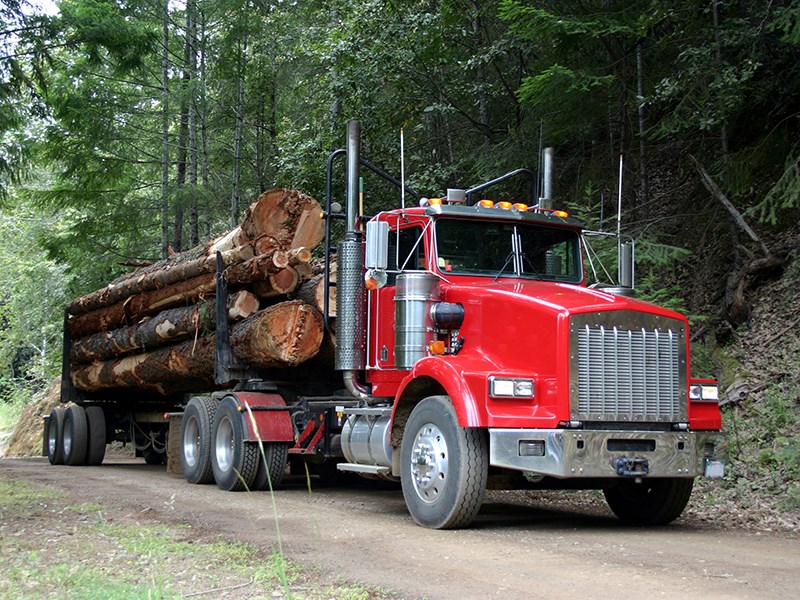More than a decade after the provincial government made policy changes to BC’s forest industry, optimism about its future is waning, according to Truck Loggers Association (TLA), a forest contractor lobby group.
That is the view of mayors from 27 coastal communities surveyed by TLA for its community perspectives report on the BC coastal forest industry.
City of Powell River mayor Dave Formosa participated in the survey and said that when local forest contractors fold it has a ripple effect throughout communities.
“We’ve seen contractors go out of business in Powell River,” said Formosa. “First, you see job loss. These contractors are huge, great community supporters. It leaves a big hole.”
TLA represents more than 450 independent sawmills, logging contractors, small-tenure harvesters, road builders, trucking firms, log brokers, value-added wood re-manufacturers and industry suppliers in BC coastal forest communities. The lobby group last surveyed the mayors in 2004, just as the BC Liberals launched its forestry restructuring strategy.
It was a plan that consolidated forest tenures, deregulated management practices and did away with harvest allocations that historically required BC companies to supply provincial sawmills and pulp and paper mills.
“Many coastal communities that were once heavily reliant on the forest industry are still reeling from the impacts of tenure consolidation and mill closures,” TLA stated in the report.
TLA director Howie McKamey, former owner of Goat Lake Forest Products, said Powell River has not been spared from any of the transitional pain.
“Powell River has definitely had some challenges,” said McKamey. “Powell River has been hit hard by changes in logging over the past 10 years.”
Those tough times were not just the result of changing government policy, but also a holdover from the global economic collapse of 2008, he said.
“The forest industry went through a real tough period from 2008 to 2012,” said McKamey. “Not only did log and lumber values go quite low, but we all had to buckle up because contract rates dropped down to just allow survival in the whole industry.”
Contractors who had taken on debt for retooling prior to the collapse found themselves seeking creditor protection or going out of business, said McKamey. “It’s been a tough go,” he added.
Recently, the issue for TLA has been for those contractors who survived. The price for logs and lumber has come up, but contractor rates have not, said McKamey.
“Markets have improved substantially and licensees’ profits and margins have come up, but it’s been a real struggle to get any improvement in contract rates,” he said.
While the forestry companies in the province operate through tenure agreements with the government, purchasing trees through auction or by harvesting private land, the actual logging, hauling, sorting and trucking itself is completed by contractors.
Low rates have made it even more difficult for companies to invest in new equipment.
“There’s a lot of pretty good contractors electing to get out of the business because for the investment and risk, the return is just not there,” said McKamey.
This trend is fuelling job losses that are having an effect on communities that once relied heavily on forest industry jobs.
In 2004, 88 per cent of community leaders surveyed said they felt positive about forestry’s future in their community, but in the recent survey that number has dropped down to 56 per cent.
In the latest survey, 62 per cent of community leaders said they think the forest industry is in worse shape today.
During the last decade, an estimated 70 sawmills have closed and 30,000 forestry jobs in the province have been lost.
Log-export critics say the BC Liberals’ changes to the forest practices code and creation of private-managed forest lands have only made the problem worse.
“The key issue is the structure of the forest industry,” said Ken Wu, executive director of the Ancient Forest Alliance. “It’s dominated by a few giant corporations and there aren’t any incentives or government regulations to stop the massive export of raw logs.”
Since 2009, provincial statistics for the export of whole, unprocessed timber has tripled in volume.
According to TLA, since the restructuring more than 25 forestry contractors have sought bankruptcy protection, including some in Powell River.
“Policy changes in 2003 have not yielded as much positive impact as expected,” stated the report.
There is consensus that more needs to be done. People in coastal communities, both rural and urban, need to have a better understanding of the sustainability of the coastal forest industry, stewardship practices and the benefits it offers to all British Columbians, the TLA report concluded.
According to Wu, the problem is not that the government went ahead with changes 12 years ago; the forest industry had already been in steady decline since the 1980s.
While he said he has sympathy for the small operators and contractors, the blame for the current situation rests on the shortsightedness of an industry that has depleted old-growth forests and has not reinvested in mill infrastructure to handle second-growth wood, said Wu.
According to Wu, even the provincial business lobby and local governments around the region have supported the idea of protecting what is left of BC’s old growth.
“What we need to do is do more with less, and focus on the second growth,” said Wu.
He added that instead of trying to market BC old growth and raw logs in China, the industry needs to find markets for value-added, sustainable, second-growth products.
That is an idea mayor Formosa likes the sound of. “I always have been a huge proponent, seeker and researcher of that,” said Formosa.
While optimism about logging on the coast might be flagging right now, Formosa is not one of the mayors who is gloomy about forestry’s future.
“I don’t see it as a sunset industry,” he said. “It’ll always be here and it’s a part of what and who we are.”



